Supply Chain Management (SCM) software is required by businesses to automate operations, logistics, and achieve maximum efficiency. SCM software handles procurement, production, inventory, and distribution while leveraging AI-driven analytics, automation, and real-time visibility. SCM software is employed by businesses across all sectors, including manufacturing, retail, logistics, and e-commerce, to reduce costs, mitigate risks, and improve customer satisfaction.
This article is intended for supply chain managers, business managers, logistics managers, and IT professionals who would like to have effective SCM solutions. The list of 15 software mentioned is chosen based on key parameters like real-time tracking, AI-based forecasting, automation, ERP integration, scalability, and ease of use. From these parameters, companies can choose the best software to enhance their supply chain activities and stay ahead in a highly dynamic market.
Criteria for Selecting the Ideal Supply Chain Management Software
Good Supply Chain Management software is the key to automating processes, lowering costs, and gaining efficiency. The most critical things to look for are explained below:
1. Scalability & Flexibility
The solution must be business growth, scalable, and flexible enough to accommodate evolving supply chain requirements, either through an enterprise organization or a small business.
2. Integration Capabilities
It ought to have smooth integration with ERP, CRM, accounting, (e.g., through AP automation software for manufacturing) and 3PL software providers so that it can be able to integrate data end-to-end.
3. Real-time Visibility & Analytics
The perfect SCM solution ought to offer real-time visibility, predictive analytics, and AI insight capabilities to facilitate data-driven decision-making and better forecasting.
4. Automation & Process Optimization
Activities such as automated tracking of inventory, order picking, and demand planning boost working efficiency and decrease labor.
5. User Experience & Ease of Use
The system must be easy to use with a simple and user-friendly interface and a low learning curve for supply chain managers, warehouse personnel, and other stakeholders.
6. Supplier & Vendor Collaboration
The system must enable collaboration among vendors through communication, contract management, and performance-tracking features.
7. Cost & Pricing Model
The price model must be business-intelligent with easy cost models, flexible subscription plans, and accurate ROI alignment features.
8. Security & Compliance
Strong data protection, encryption, and regulatory compliance (i.e., GDPR, ISO certifications) need to be enabled to encrypt sensitive supply chain data in confidentiality.
9. Customer Support & Training
Universal customer support, documentation, training collateral, and implementation support facilitate effortless adoption and continuous software success.
10. Industry-Specific Features
Some specific industries such as manufacturing, retail, logistics, or healthcare need some special features such as cold chain tracking, regulatory compliance features, or multi-channel inventory management.
Comparison of Supply Chain Management software on such aspects enables organizations to select a tool that satisfies their business objective and maximizes supply chain efficiency.
List of 15 Supply Chain Management Software
1. SAP SCM

The SAP SCM supply chain management solution has been designed to cater to the requirements of multinational companies. Companies utilize real-time information along with AI-based insights via SCM to streamline procurement along with logistics, and inventory management, as well as supplier coordination.
The integration of sophisticated prediction systems along with planning capabilities allows firms to forecast customer needs, reduce operational issues, and improve operational streamlining. SAP ERP and the software complement each other impeccably, which makes the solution suitable for large organizations.
Key Features:
- Demand forecasting and inventory optimization
- Integrated logistics and transportation management
- Supplier collaboration and procurement automation
- Real-time data analytics and AI-driven insights
Pros:
- Highly customizable for enterprise needs
- Strong integration with SAP ERP and other systems
Cons:
- Steep learning curve for new users
- Expensive implementation and maintenance costs
Pricing:
Contact SAP for a custom quote.
Who Should Use It?
Large enterprises need an end-to-end supply chain solution with strong analytics and automation.
2. Oracle SCM Cloud
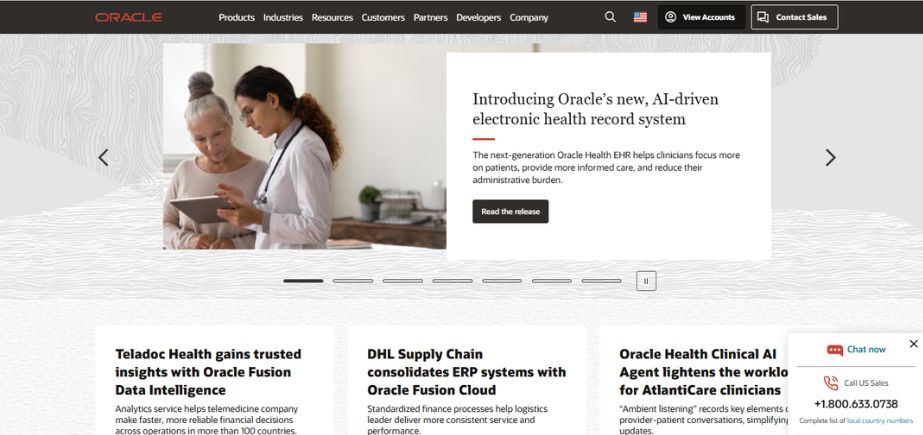
Through AI-powered tools, Oracle SCM Cloud operates as a cloud-based supply chain management solution that maintains autonomy for procurement logistics and inventory tasks. Through its machine learning capabilities, Oracle SCM Cloud delivers important business insights that businesses use to perfect supply chain choices and deal with disruptions while strengthening their collaboration abilities. Enterprise users benefit from this platform because it connects with Oracle ERP systems.
Key Features:
- AI-powered demand planning and forecasting
- End-to-end supply chain automation
- Warehouse, procurement, and logistics management
- IoT and blockchain for supply chain tracking
Pros:
- Scalable for both mid-size and large enterprises
- Strong cloud infrastructure with security features
Cons:
- Requires training for full utilization
- High implementation costs
Pricing:
Custom pricing based on business needs.
Who Should Use It?
Enterprises looking for a flexible, cloud-based SCM solution with AI capabilities.
3. Blue Yonder (JDA Software)
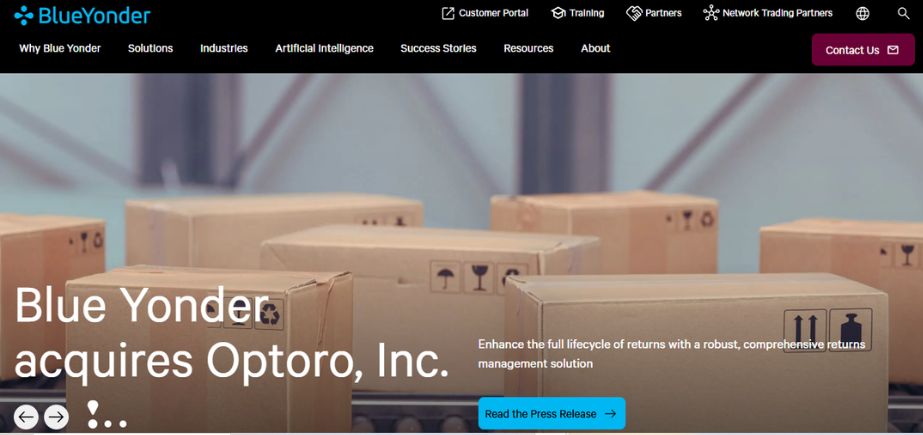
Blue Yonder (formerly JDA Software) is a leader in AI-driven supply chain optimization. It provides real-time demand planning, inventory optimization, and auto-logistics planning. Its machine learning-based algorithms allow companies to remove waste, optimize transportation, and improve warehouse operations. The software has wide-ranging usage in retail, manufacturing, and logistics to make decisions and operate more effectively.
Key Features:
- Predictive analytics for demand and supply planning
- AI-based inventory and order optimization
- Transportation and logistics management
- Integrated warehouse and workforce planning
Pros:
- AI-driven insights improve efficiency
- Scalable for global supply chain networks
Cons:
- High cost for small and mid-size businesses
- Complex implementation process
Pricing:
Contact Blue Yonder for pricing details.
Who Should Use It?
Large enterprises with complex logistics and inventory needs.
4. Manhattan Associates
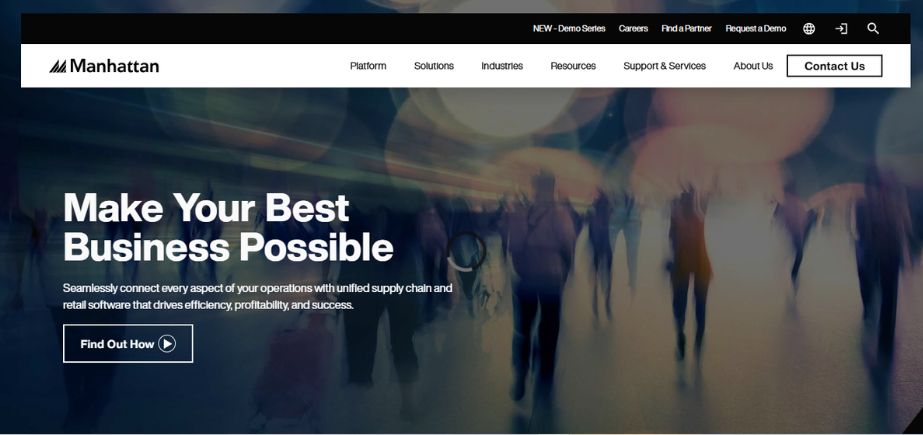
Manhattan Associates is one of the leading supply chain management software with a warehouse and logistics optimization focus. It provides advanced inventory management, order fulfillment, and transportation planning to optimize working efficiency. Predictive forecasting through AI-driven analytics, real-time tracking of shipments, and demand planning in the platform allows businesses to minimize delays and incur less cost.
With its scalability and automation features, Manhattan Associates can handle complex supply chain operations in retail, manufacturing, and distribution businesses. Its software maximizes order accuracy and visibility and automates warehouse operations, making it one of the top business solutions for businesses that need effective logistics management.
Key Features:
- Real-time warehouse and distribution management
- Transportation and fleet optimization
- AI-driven inventory and demand forecasting
- Omnichannel order fulfillment
Pros:
- Best-in-class warehouse and logistics solutions
- Strong AI-driven predictive analytics
Cons:
- High implementation and maintenance costs
- Requires technical expertise for customization
Pricing:
Custom pricing based on business requirements.
Who Should Use It?
Retailers, manufacturers, and logistics providers needing advanced warehouse and transportation management.
5. Infor Nexus
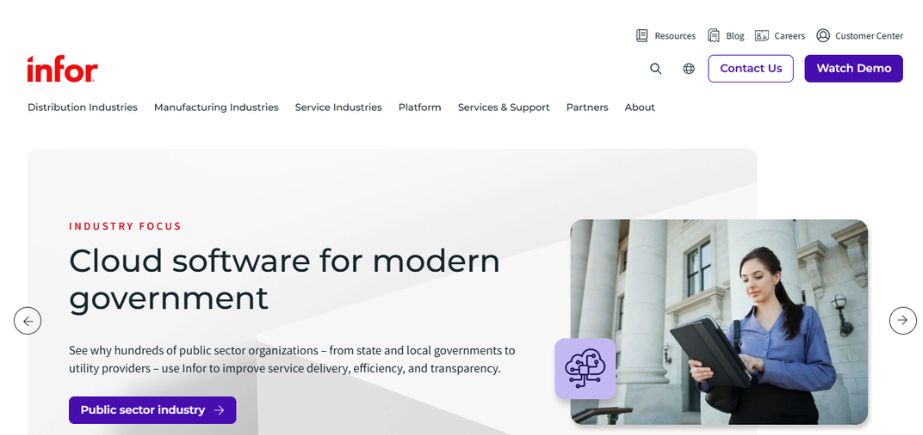
Infor Nexus is a cloud-based supply chain visibility platform meant to propel real-time tracking, supplier collaboration, and data-based decision-making. It applies AI-powered analytics to enable businesses to manage supply chain risk more effectively, optimize inventories, and enhance delivery performance. By providing end-to-end visibility, it allows businesses to track shipments, predict disruptions, and automate procurements in global supply chains.
The platform is ERP, warehouse, and transportation system integrated to offer an integrated, data-driven supply chain environment. It is best suited for organizations with complex networks of logistics because Infor Nexus optimizes efficiency, agility, and transparency of operations in managing supply chains.
Key Features:
- Real-time supply chain visibility and tracking
- AI-driven demand and supply forecasting
- Supplier collaboration and procurement automation
- Integrated transportation and financial management
Pros:
- Real-time data for proactive decision-making
- Strong collaboration features for supplier networks
Cons:
- Expensive for small businesses
- Requires proper integration with existing systems
Pricing:
Custom pricing based on business needs.
Who Should Use It?
Enterprises looking for real-time supply chain visibility and collaborative planning tools.
6. Kinaxis RapidResponse
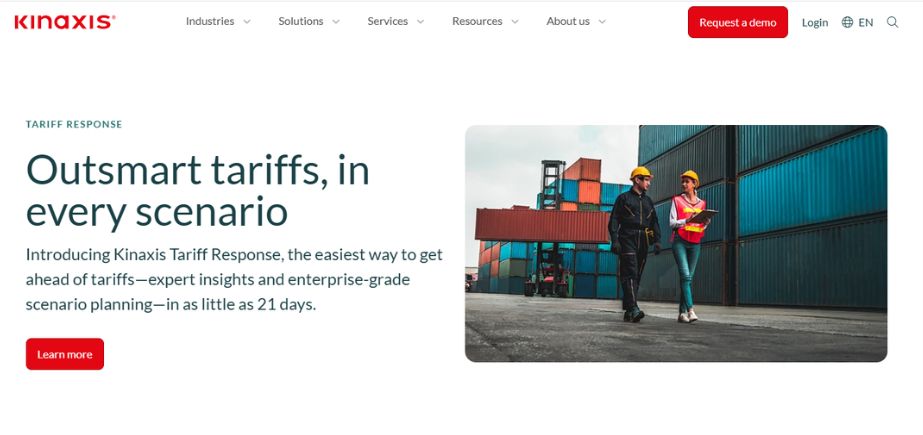
Kinaxis RapidResponse is an artificial intelligence-based supply chain planning system. It enables real-time balancing of supply and demand. It offers predictive analytics, scenario planning, and AI-based forecasting, which enables businesses to respond rapidly to changes in the market. It assists businesses in handling risks, decreasing lead times, and optimizing inventory by giving them real-time visibility into the operations of the supply chain.
With its concurrent planning feature, organizations can analyze multiple scenarios at one time ensuring timely decision-making. Employed in various industries such as manufacturing, retail, and healthcare, Kinaxis RapidResponse attains the utmost efficiency, responsiveness, and cooperation in supply chain management.
Key Features:
- Real-time demand and supply planning
- AI-driven inventory optimization
- Integrated scenario planning for risk mitigation
- Rapid response capabilities for supply chain disruptions
Pros:
- Fast implementation with cloud-based architecture
- Excellent scenario planning for proactive decision-making
Cons:
- Can be complex for first-time users
- Premium pricing model
Pricing:
Contact Kinaxis for a quote.
Who Should Use It?
Large manufacturers and retailers needing real-time demand and supply planning.
7. E2open
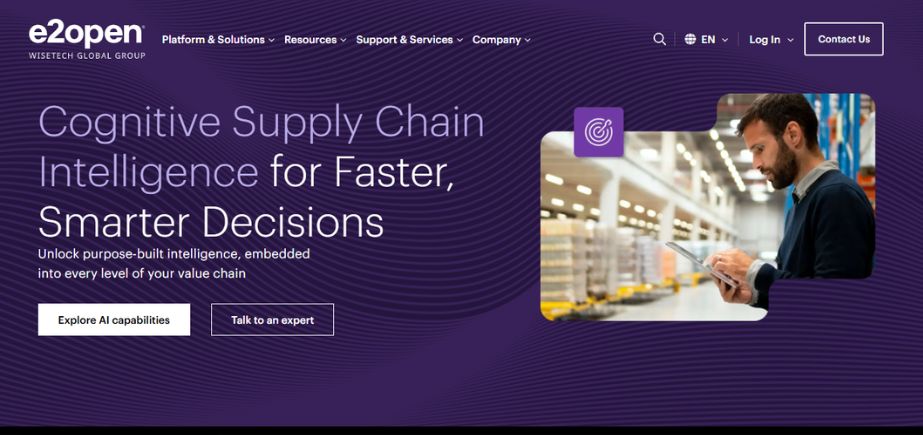
E2open is a top-to-tail supply chain management platform that connects manufacturers, suppliers, logistics services providers, and distributors within a single network. It supports real-time demand planning, artificial intelligence-based forecasting, logistics monitoring, and automated stock management. The platform amplifies collaboration across the supply chain to enable businesses to streamline processes, reduce costs, and drive greater efficiency.
The predictive analytics solution of E2open allows enterprises to anticipate disruption, route optimizes transportation and strengthen supplier engagement. Widely used in consumer goods, manufacturing, and retail, it is a robust solution for global companies with sophisticated supply networks.
Key Features:
- AI-powered demand planning and inventory optimization
- Real-time supplier collaboration and procurement management
- Integrated logistics and transportation management
- Cloud-based multi-enterprise platform
Pros:
- Strong supplier network integration
- AI-driven insights for optimization
Cons:
- Complex integration with legacy systems
- High subscription costs for small businesses
Pricing:
Custom pricing available upon request.
Who Should Use It?
Enterprises needing full supply chain integration with AI-driven analytics.
8. Logility
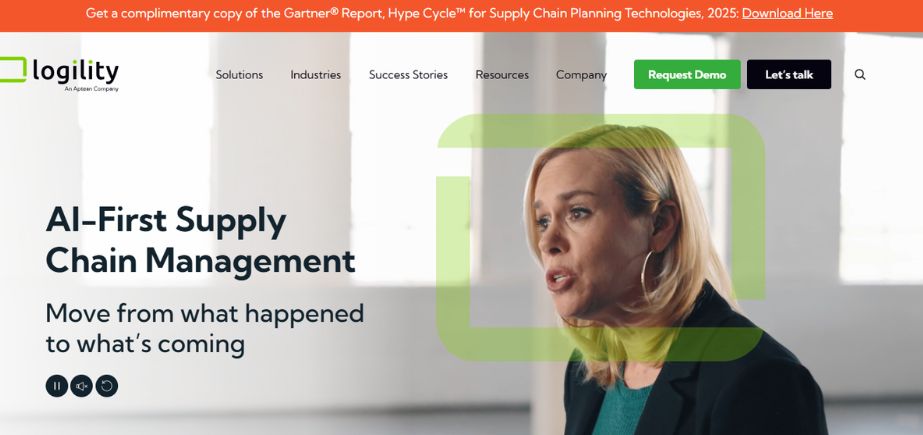
Logility is a supply chain optimization software based on artificial intelligence that aims to improve demand planning, inventory management, and supplier coordination. It makes better predictions of future occurrences through analytics and avoids stockouts by saving money. Real-time information from the companies is used to facilitate anticipatory decision-making and flexibility to respond to market variations.
Logility entails scenario modeling that assists in simulating different supply chain strategies prior to implementing them. As a cloud technology, it provides scalability and responsiveness for expanding organizations.
Key Features:
- AI-powered demand forecasting and planning
- Real-time inventory optimization
- Supplier collaboration and risk management
- Logistics and transportation management
Pros:
- Predictive analytics enhance decision-making
- Scalable for global supply chains
Cons:
- Expensive for small businesses
- Requires training for full utilization
Pricing:
Contact Logility for pricing details.
Who Should Use It?
Retailers and manufacturers requiring AI-driven demand and supply chain forecasting.
9. Epicor SCM
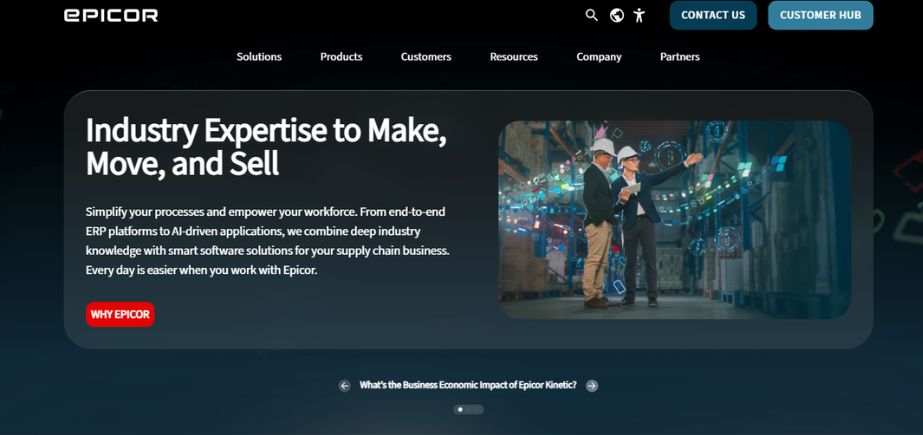
Epicor SCM is an extremely integrated supply chain management software solution that integrates with Epicor ERP without any issues. The solution provides functionalities such as demand planning, inventory automation, warehouse management, and supplier communication. The system provides streamlined processes, reduced overheads, and enhanced logistics optimization.
Its scalability at a high level also makes it suitable for working with manufacturers, distributors, and retailers with end-to-end supply chain automation requirements. Real-time tracking within the system also allows workflow management in an efficient manner.
Key Features:
- ERP-integrated demand planning
- Real-time order and inventory management
- Warehouse and supplier collaboration tools
- AI-driven forecasting and analytics
Pros:
- Strong integration with Epicor ERP
- Scalable for manufacturing and distribution industries
Cons:
- Requires an Epicor ERP subscription
- Can be costly for smaller businesses
Pricing:
Custom pricing based on deployment needs.
Who Should Use It?
Manufacturers and distributors looking for ERP-integrated supply chain solutions.
10. Anaplan
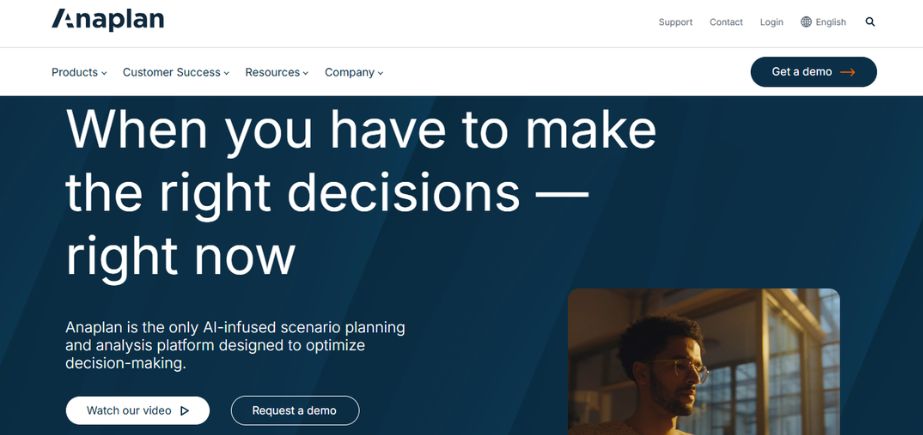
Anaplan is a planning platform to integrate to allow businesses to supply chains strategically. It has scenario modeling, artificial intelligence forecasting, and collaborative planning capabilities to enhance decision-making and operational effectiveness. Businesses are able to dynamically manage inventory, procurement, and logistics using real-time data.
Anaplan’s scalable and cloud-based architecture allows it to be appropriate for large companies with complex supply chains. The platform provides cross-functional visibility to enable various departments to get aligned on supply chain strategies.
Key Features:
- AI-driven demand and supply forecasting
- Integrated scenario planning and predictive analytics
- Financial planning and budgeting tools
- Cloud-based real-time collaboration
Pros:
- Strong scenario modeling for risk management
- Scalable cloud-based architecture
Cons:
- Steep learning curve for new users
- Expensive for small businesses
Pricing:
Custom pricing available upon request.
Who Should Use It?
Enterprises needing strategic supply chain planning with AI-driven insights.
11. HighJump (now Körber)
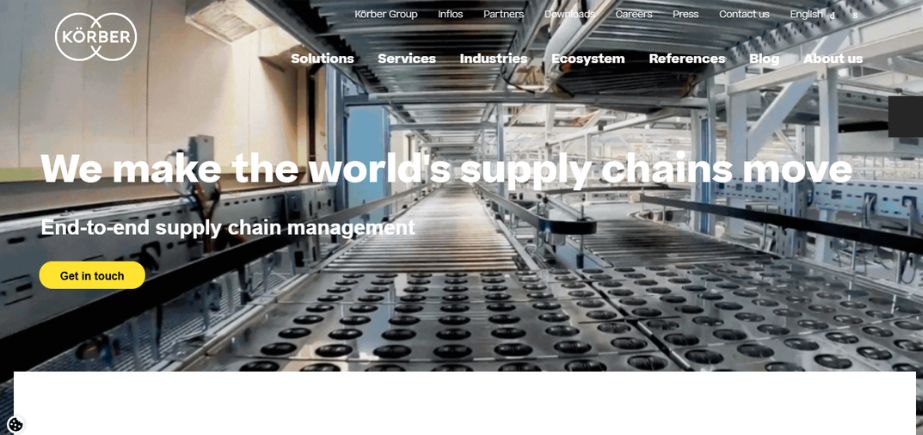
HighJump is a Körber company, and it has cloud-based solutions for logistics and warehouse management. It automates inventory, shipping tracking in real-time, order fulfillment, and artificial intelligence-enabled warehouse management. The software provides companies with automated warehouse processes, supply chain transparency, and the ability to ensure better customer satisfaction.
Its scalable features make it an ideal platform for growing businesses as it maximizes logistics procedures and distribution channels. Körber also provides integration with robotic automation to enhance efficiency even more.
Key Features:
- AI-powered warehouse and inventory management
- Real-time logistics and transportation tracking
- Integrated order fulfillment and supplier collaboration
- Mobile-enabled warehouse management
Pros:
- Cloud-based and highly scalable
- Strong warehouse automation features
Cons:
- Higher implementation costs
- Requires integration with ERP systems
Pricing:
Contact Körber for a custom quote.
Who Should Use It?
Retailers and distributors needing advanced warehouse and logistics automation.
12. Fishbowl Inventory
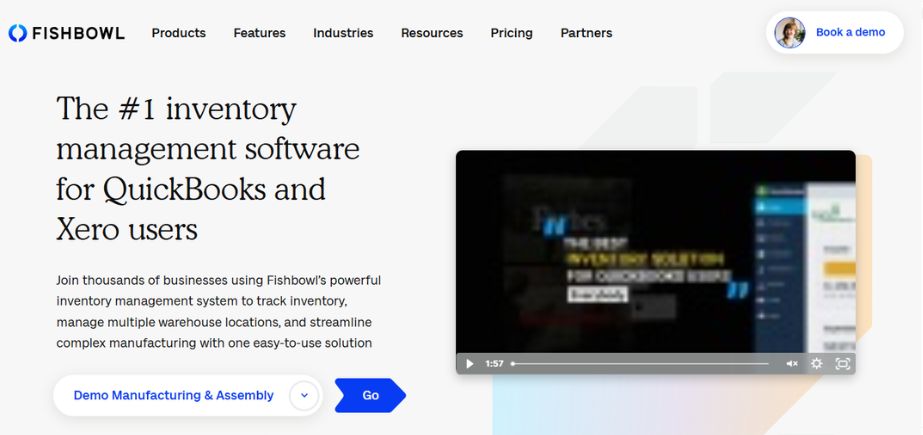
Fishbowl Inventory is a low-cost inventory management software that is suitable for small and mid-sized enterprises (SMEs). It offers barcode scanning, inventory tracking, order management, and QuickBooks integration to enable businesses to easily track stock levels and warehouse operations. The software also offers multi-location tracking and reordering automation to minimize stockouts.
Fishbowl is very customizable to offer scalability as businesses grow. It is suitable for SMEs that need an inexpensive, easy-to-use inventory management system with accounting integration.
Key Features:
- Inventory tracking and demand forecasting
- Warehouse automation and barcode scanning
- QuickBooks integration for financial management
- Real-time stock and order management
Pros:
- Cost-effective for small businesses
- Easy integration with QuickBooks
Cons:
- Limited scalability for large enterprises
- Requires additional modules for advanced features
Pricing:
Starts at $4,395 (one-time license fee).
Who Should Use It?
SMEs looking for affordable inventory and warehouse management.
13. Coupa Supply Chain Design & Planning
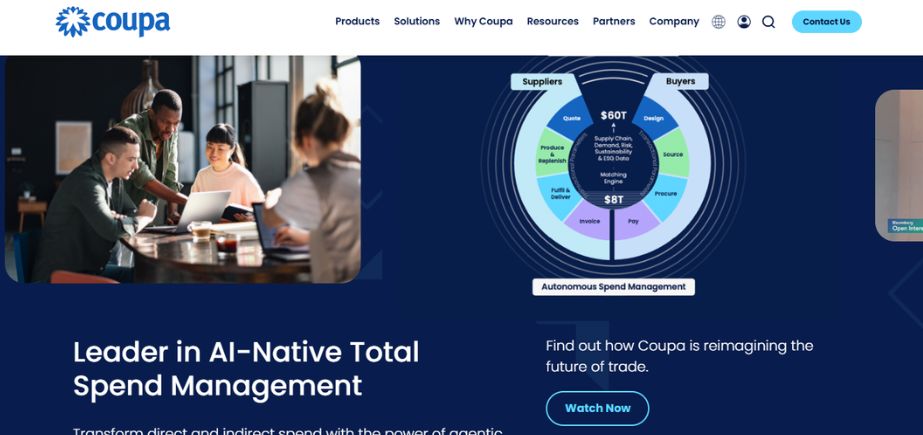
Coupa Supply Chain Design & Planning uses AI-driven insights to automate procurement, supplier collaboration, and demand forecasting. It assists businesses in lowering costs, reducing supply chain risks, and improving efficiency.
The solution offers real-time analytics and scenario modeling to assist businesses in making informed supply chain decisions. Coupa also features cost optimization capabilities that assist businesses in lowering procurement costs and optimizing sourcing plans.
Key Features:
- AI-driven procurement and supplier collaboration
- Real-time demand and supply planning
- Integrated financial planning tools
- Risk assessment and scenario modeling
Pros:
- Strong AI-driven analytics
- Scalable for global supply chains
Cons:
- Expensive for small businesses
- Requires integration with ERP solutions
Pricing:
Custom pricing based on business needs.
Who Should Use It?
Enterprises looking for AI-driven procurement and supply chain planning.
14. Microsoft Dynamics 365 SCM

Microsoft Dynamics 365 SCM is an automated supply chain solution with scalability, real-time visibility, AI-based analytics, and instant integration with Microsoft applications such as Azure, Power BI, and Office 365.
It allows businesses to streamline inventory management, logistics, procurement, and warehouse operations. With cloud-based architecture, the system allows automated workflows, demand forecasting, and collaboration with suppliers. Microsoft Dynamics 365 SCM is suitable for large businesses seeking a data-driven and integrated supply chain management approach.
Key Features:
- AI-powered supply chain forecasting
- Automated inventory and logistics management
- Cloud-based real-time tracking and analytics
- Strong integration with Microsoft products
Pros:
- Scalable for mid-size and large enterprises
- Seamless Microsoft ecosystem integration
Cons:
- Requires Dynamics 365 subscription
- Customization can be complex
Pricing:
Starts at $180/user per month.
Who Should Use It?
Businesses using Microsoft’s ecosystem for scalable supply chain automation.
15. SYSPRO
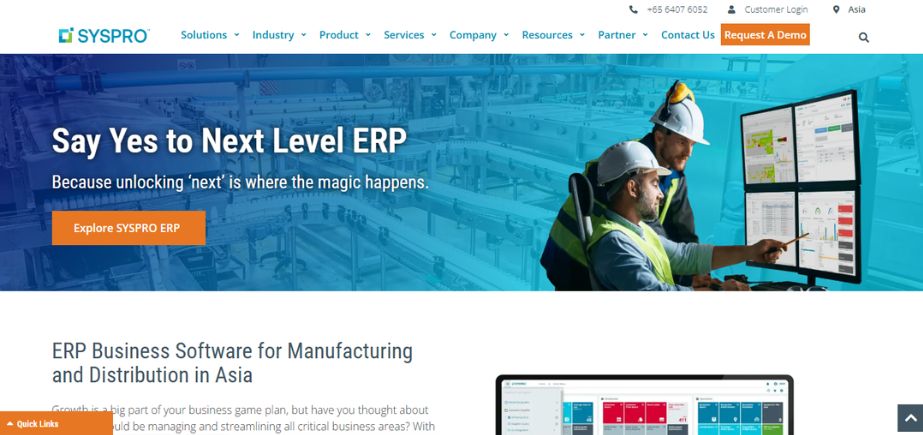
SYSPRO is an ERP-integrated supply chain management software designed for distributors and manufacturers. The software offers production planning, inventory automation, demand forecasting, and supplier collaboration for automating business operations. SYSPRO offers industry-specific customization and real-time visibility into supply chain operations.
Additionally, it has AI-driven insights that improve order fulfillment and logistics efficiency. SYSPRO boasts extensible and open architecture, and thus it is ideal for enhancing operational flexibility along with supply chain performance within firms.
Key Features:
- Real-time demand and supply planning
- Inventory and warehouse management
- Supplier collaboration and procurement tools
- ERP-integrated financial tracking
Pros:
- Tailored for manufacturing and distribution businesses
- Strong ERP integration
Cons:
- Requires SYSPRO ERP for full functionality
- Not ideal for service-based industries
Pricing:
Custom pricing available upon request.
Who Should Use It?
Manufacturers and distributors looking for ERP-integrated supply chain automation.
Comparison Between Different Supply Chain Management Software
Here’s a table comparing the key features, pricing, use cases, and official websites of the mentioned supply chain management software:
| Software | Key Features | Pricing | Best For | Website |
| SAP SCM | End-to-end supply chain management, AI-driven demand forecasting, real-time analytics, warehouse & logistics optimization | Custom pricing | Large enterprises needing a comprehensive SCM solution | sap.com |
| Oracle SCM Cloud | Cloud-based SCM, AI-driven analytics, inventory & demand planning, supplier collaboration | Custom pricing | Enterprises requiring cloud-based supply chain automation | oracle.com |
| Blue Yonder (JDA Software) | AI-powered supply chain optimization, automated logistics planning, real-time demand forecasting | Custom pricing | Retail, manufacturing, and logistics companies optimizing operations | blueyonder.com |
| Manhattan Associates | Warehouse & logistics management, real-time tracking, order fulfillment, AI-based inventory optimization | Custom pricing | Businesses focusing on warehouse and distribution optimization | manh.com |
| Infor Nexus | Cloud-based supply chain visibility, supplier collaboration, real-time tracking, AI-powered insights | Custom pricing | Enterprises managing global supply chains | infor.com |
| Kinaxis RapidResponse | AI-driven demand planning, real-time analytics, scenario modeling, risk mitigation | Custom pricing | Enterprises needing fast, responsive supply chain planning | kinaxis.com |
| E2open | End-to-end supply chain integration, logistics tracking, AI-powered forecasting, supplier management | Custom pricing | Global businesses seeking integrated supply chain solutions | e2open.com |
| Logility | Predictive analytics, inventory management, supplier collaboration, demand forecasting | Custom pricing | Businesses needing data-driven supply chain insights | logility.com |
| Epicor SCM | ERP-integrated supply chain automation, warehouse management, demand forecasting | Custom pricing | Companies using Epicor ERP for supply chain automation | epicor.com |
| Anaplan | Connected planning, AI-powered forecasting, real-time analytics, scenario modeling | Custom pricing | Enterprises needing strategic supply chain planning | anaplan.com |
| HighJump (now Körber) | Warehouse & logistics automation, AI-driven inventory tracking, cloud-based management | Custom pricing | Businesses focusing on warehouse and logistics optimization | koerber-supplychain.com |
| Fishbowl Inventory | Inventory tracking, barcode scanning, QuickBooks integration, order management | Starts at $50 monthly | SMEs needing an affordable inventory management solution | fishbowlinventory.com |
| Coupa Supply Chain Design & Planning | AI-driven insights, supplier collaboration, cost optimization, procurement automation | Custom pricing | Companies focusing on cost-efficient supply chain planning | coupa.com |
| Microsoft Dynamics 365 SCM | AI-driven analytics, real-time visibility, seamless integration with Microsoft products | Starts at ₹ 689.00/month | Businesses using Microsoft’s ecosystem for SCM | microsoft.com |
| SYSPRO | ERP-integrated SCM, demand forecasting, supplier collaboration, inventory automation | Custom pricing | Manufacturers and distributors needing ERP-based supply chain solutions | syspro.com |
Conclusion
Selecting the right supply chain management software depends on the specific requirements of a firm, the line of business, and its scale of operations. SAP SCM and Oracle SCM Cloud are ideal for big businesses looking for comprehensive, end-to-end supply chain solutions.
Blue Yonder (JDA Software) and Kinaxis RapidResponse are among the best in AI-driven forecasting and demand planning, hence best for firms with a predictive analytics focus. Manhattan Associates and High Jump (now Körber) are suitable choices for companies that specialize in warehouse automation and logistics management.
Infor Nexus and E2open are strong supply chain visibility and supplier collaboration solutions for medium-sized companies. Small companies with limited budgets looking for cost-effective inventory management solutions can use Fishbowl Inventory or Logility, which both provide easy stock management and automation. Companies that are interested in AI-driven insights and strategic planning can consider Coupa Supply Chain Design & Planning or Anaplan, both of which are good at making supply chain decisions with robust analytics.
Lastly, the best supply chain management software is determined by business needs, price, and operational complexity. International supply chain organizations must prioritize real-time tracking and AI-fine-tuned solutions, while small businesses can prioritize cost and simplicity. Proper investment can drive significant supply chain efficiency, cost savings, and overall business performance.
FAQs
1. What is supply chain management software?
SCM software is an electronic program that assists organizations to manage and streamline their supply chain activities efficiently from procurement through to demand planning and from inventory to logistics, along with supply chain collaboration.
2. What are the essential supply chain management software features?
Key features include demand forecasting, real-time monitoring of inventories, management of suppliers, logistics and transport management, analytics via AI, and integration with ERP.
3. For whom can supply chain management software be used?
SCM software can be used by manufacturers, distributors, retailers, logistics companies, and e-commerce businesses that need to simplify supply chain functions, decrease costs, and drive higher efficiency.
4. What are the benefits of supply chain management software?
Benefits include improved supply chain visibility, reduced operating expenses, enhanced efficiency, better demand forecasting, automated business processes, and better supplier relationships.
5. What is the best way to choose the right supply chain management software for my company?
Consider factors like firm size, industry needs, affordability, scalability, integration, and ease of use. Large companies may need full-featured solutions like SAP SCM, whereas small businesses may utilize cost-effective applications like Fishbowl Inventory.



